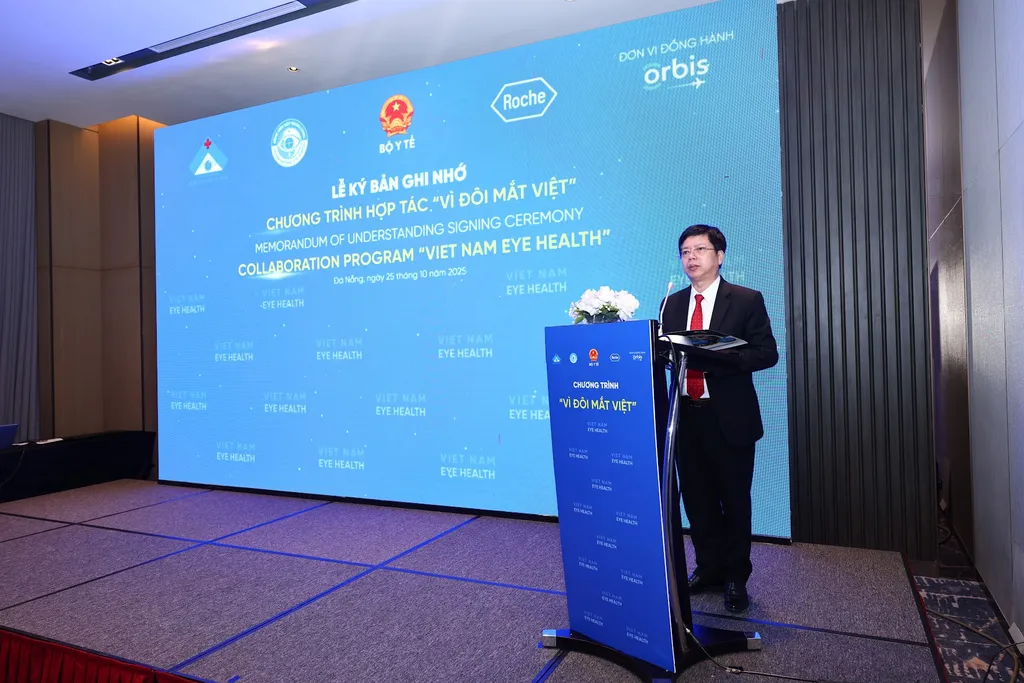 Society
Society

 |
| Delegates sign a Memorandum of Understanding to launch the “Việt Nam Eye Health” partnership programme on October 25. — Photo courtesy of the MSA |
ĐÀ NẴNG — The Medical Service Administration (MSA) under the Ministry of Health, the Việt Nam National Eye Hospital, the Hồ Chí Minh City Eye Hospital and Roche Pharma Vietnam signed a Memorandum of Understanding to launch the “Việt Nam Eye Health” partnership programme on October 25.
The strategic partnership aims to develop a comprehensive management model for patients with diabetic retinopathy and macular oedema, which are among the leading causes of blindness in the working-age population in Việt Nam.
With the companionship of Orbis Việt Nam, the programme aims to build a comprehensive management model for patients with diabetic eye diseases in Việt Nam.
The programme has set out a specific roadmap to realise three major objectives, including increasing patient awareness and access to early diagnosis, treatment and management of diabetic retinopathy (DR) and diabetic macular edema (DME); enhancing diagnosis, treatment and management capacity for healthcare professionals to improve the quality of management unit for patients with DR and DME; designing and developing a comprehensive management unit model for patients with DR and DME so that patients can access early diagnosis, treatment and timely follow-up.
In the implementation process, the parties will focus on designing, building, and piloting this model at participating hospitals, as well as coordinating the updating and issuance of national guidelines on the diagnosis, treatment, and management of retinal diseases to serve as a basis for scaling up the model later.
 |
| MSA Deputy Director Nguyễn Trọng Khoa speaks at the event. — Photo courtesy of the MSA |
At the signing ceremony, MSA Deputy Director Nguyễn Trọng Khoa believed that the model would not only help improve the quality of treatment for patients but also mark a significant step forward for the development of ophthalmology in public hospitals, especially at the provincial level.
"The application of new technologies like artificial intelligence (AI) in early screening is a strategic direction that we will actively promote,” said Khoa.
Director of the Việt Nam National Eye Hospital, Vice President & General Secretary of Viet Nam Ophthalmology Society Phạm Ngọc Đông, is also committed to devoting the hospital’s best resources and expertise to successfully build this comprehensive management model, especially in developing and refining professional guidelines and proposing related policies.
 |
| Director of the Việt Nam National Eye Hospital, Vice President & General Secretary of Viet Nam Ophthalmology Society Phạm Ngọc Đông |
“We are committed to helping diabetic patients receive early diagnosis and treatment for eye complications, thereby preserving their vision and enhancing their quality of life, especially for those of working age,” said Đông.
Within the framework of the partnership, the MSA plays the role of the focal unit and is generally responsible for the management, development and implementation of the programme. Related units, including hospitals participating in the programme, are responsible for reporting periodically every six months on the implementation situation.
The programme's objectives also aim at one of the general goals of the National Strategy for Blindness Prevention until 2020 and vision until 2030, which is to increase the rate of diabetic patients examined and monitored for eye diseases to over 75 per cent.
Director of Hồ Chí Minh City Eye Hospital Lê Anh Tuấn added: “We are committed to supporting the development of an efficient retinal disease screening and early detection system for the large number of diabetic patients managed at primary care facilities, to ensure patients receive timely care, monitoring, and treatment, while also helping to reduce the patient load at eye speciality hospitals.”
Retinal diseases are not only a clinical issue but also create a significant socio-economic burden, negatively impacting the productivity and quality of life for millions of people. Globally, retinal diseases are among the leading causes of permanent vision loss.
According to the World Health Organisation, up to one-third of diabetic patients suffer from retinopathy to some extent. Addressing the challenges in diagnosing and treating retinal diseases, especially diabetic retinopathy, is a pressing public health priority.
In Việt Nam, there are approximately seven million people aged 30-69 with diabetes. Notably, diabetic retinopathy is one of the leading causes of blindness among the working-age population. Statistics also show that 39.5 per cent of diabetes-related complications are related to the eyes and nerves. — VNS




